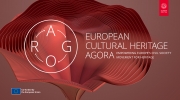Speech – Sneška Quaedvlieg-Mihailović – Education Youth Culture and Sports (EYCS) Council of the EU Meeting
Speech delivered by Europa Nostra’s Secretary General, Sneška Quaedvlieg – Mihailovic, at the Policy Debate “Cultural heritage and heritage rights in the context of sustainable development and the future of Europe”, addressing the EU Ministers in charge of Culture at the EYCS Council meeting on 30 November. Watch the Policy Debate / Public session of the EYCS meeting here.
“Thank you, Mr President.
It is a great pleasure to see you again, after the Slovenian Presidency Conference in Ljubljana and also after our European Cultural Heritage Summit in Venice which you kindly attended together with Dario Franceschini, Minister of the host country and with Nina Obuljen-Koržinek, Croatian Minister who joined us online. During the last 3 months, I have also enjoyed meeting Commissioner Gabriel in Sofia, Greek Minister Lina Mendoni in Epirus and the Portuguese Minister Graça Fonseca in Lisbon. But today, it is my very special honour to address Ministers of all 27 EU Member States. I am doing this on behalf of EUROPA NOSTRA, the European Voice of Civil Society committed to cultural heritage and also on behalf of the European Heritage Alliance and the Climate Heritage Network.
Excellencies,
Today, Europe and the World are facing so many challenges and emergencies: from the pandemic to climate change; from the economic and social crisis to serious threats to our democracy and demography. This is the time when we must recall that the European Union is first and foremost a Union of shared values, and a Union based on a rich cultural and humanistic inheritance, as defined in the preamble and articles 2 and 3 of the Treaty. Cultural rights, including heritage rights, form part of these shared values. They are also closely interconnected with all other human rights, political, environmental, social and economic. Together we must protect and promote these rights, since they are facing many threats and cannot be taken for granted.
Driven by a sense of urgency, and a strong need to reduce and overcome these threats, at our recent European Cultural Heritage Summit Europa Nostra has launched a “Venice Call to Action for a New European Renaissance”. I invite you and other members of your respective governments to examine and get inspired by the 12 concrete action points formulated in this document which you have received last week.
For the sake of brevity, let me share with you only three key messages included in our Venice Call to Action:
Message 1: We cannot build a better future for Europe and its citizens, if we do not strengthen our sense of belonging to a wider European family, our sense of togetherness. What better tool to achieve this than through knowledge, respect and care for our shared cultural heritage, with its multiple layers, from local and regional to national and European.
Message 2: Cultural heritage is so much more than a sector, it is a vector to achieve a more humane, sustainable, inclusive and more beautiful Europe. This is why we must recognize and unleash the power of culture and heritage to fulfil all strategic priorities of the European Union: From nurturing the well-being of our communities, and the quality of our environment, built and natural, urban and rural, …to tackling climate change through an ambitious European Green Deal with its “soul” – the New European Bauhaus, and with full implementation of all 17 Sustainable Development Goals (SDGs). The same is true for EU’s external relations, from the neighbouring Western Balkans to other continents of the world.
And the final message: three years after the historic European Year of Cultural Heritage, let us lift up the game and let us seize the golden opportunity provided by the Conference on the Future of Europe to place our shared cultural heritage where it belongs – at the very heart of the entire European project, as the powerful catalyst for a New European Renaissance.
Let me end
a) By applauding the Slovenian Presidency for placing cultural heritage high on the agenda of the EU Council;
b) By encouraging the forthcoming French Presidency to recognise the multiple value of cultural heritage for Europe’s post-pandemic recovery and for our sense of belonging to Europe; and
c) By thanking the Czech Presidency for their invitation and support to hold our next year’s European Heritage Summit at the end of September in Prague.
We look very much forward to our future exchanges, encounters and collaboration.“




